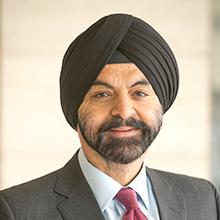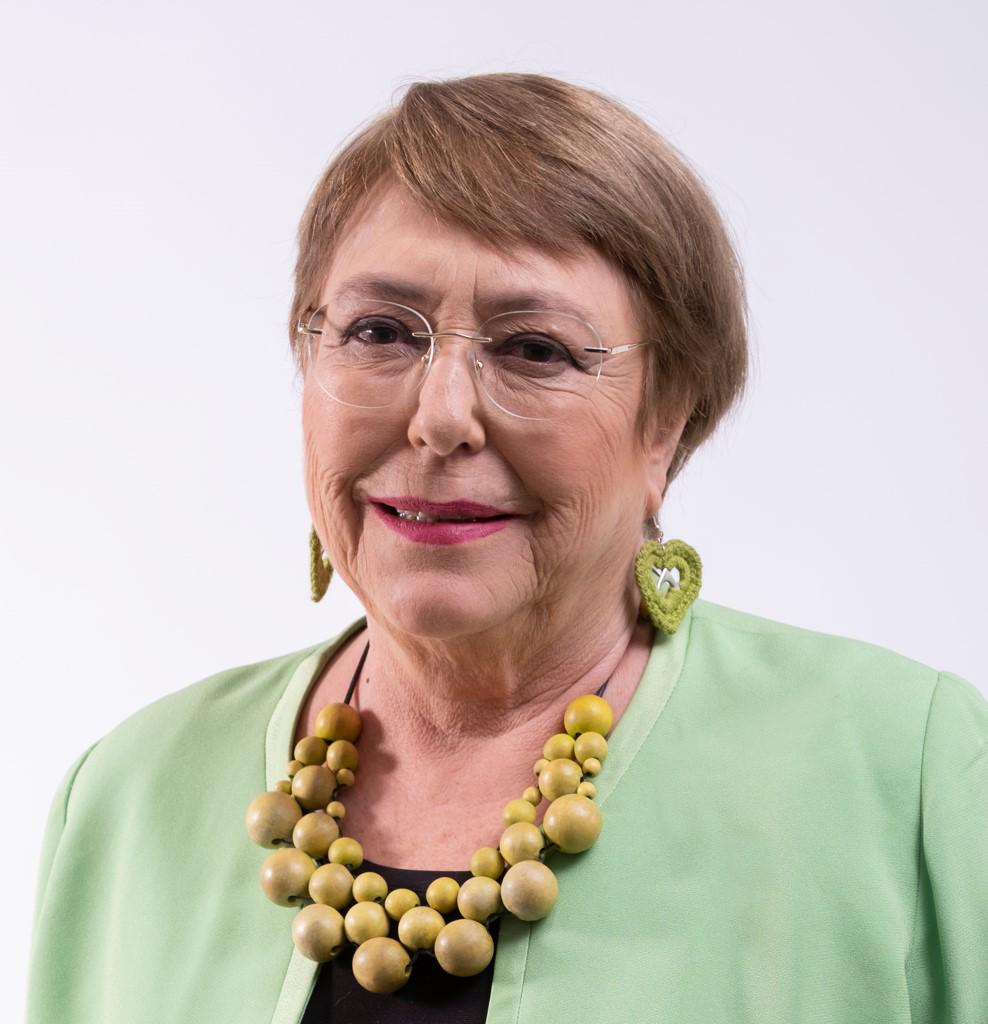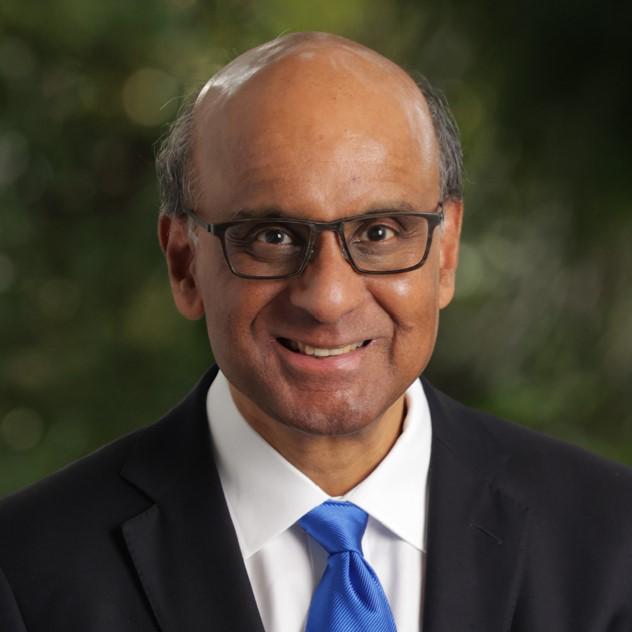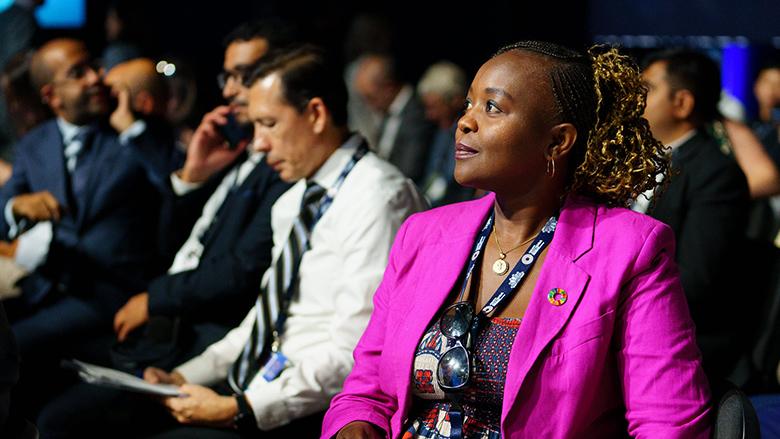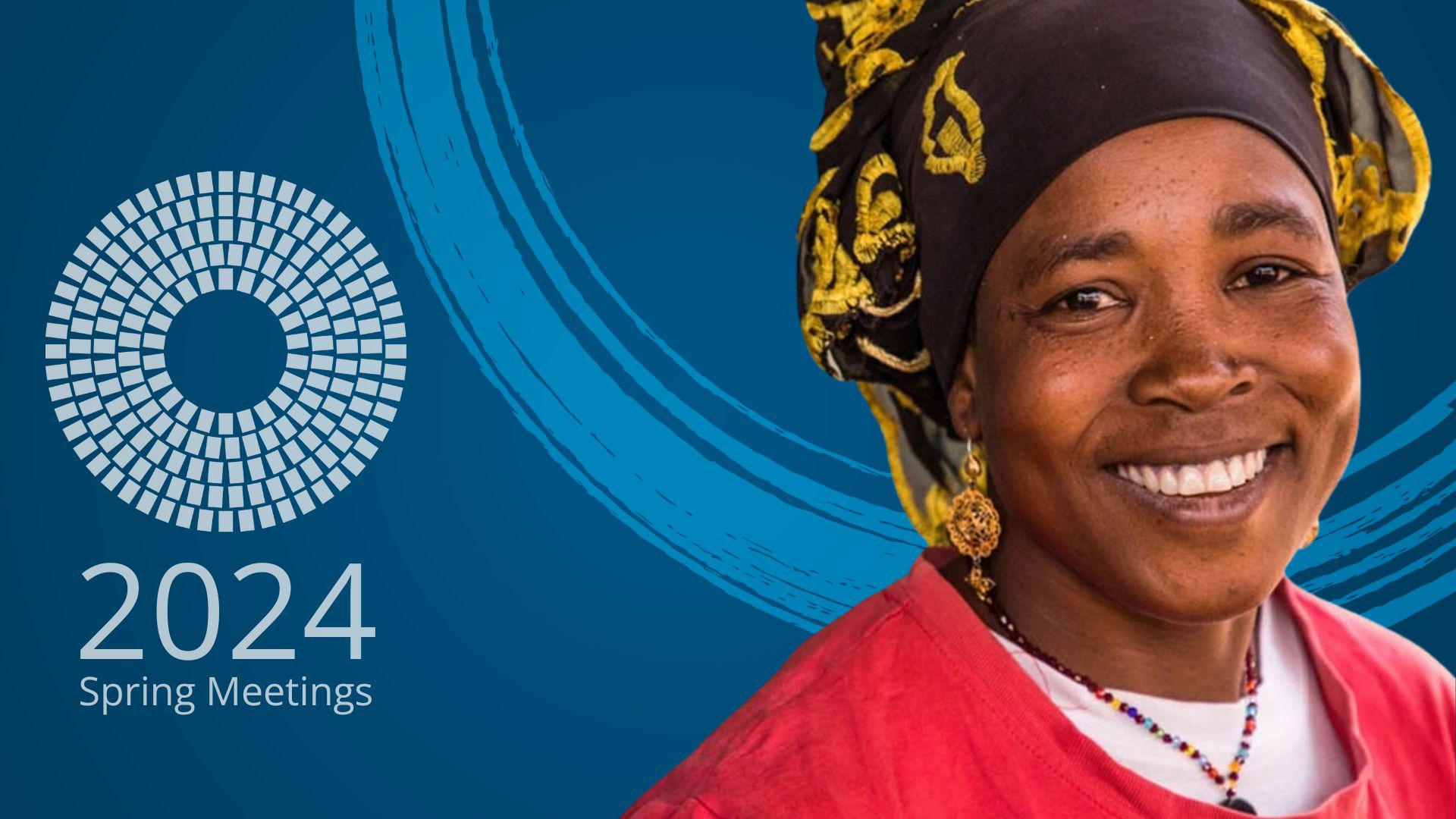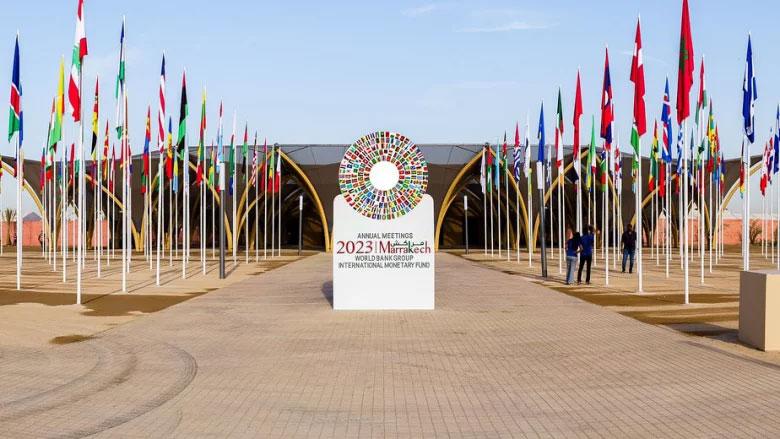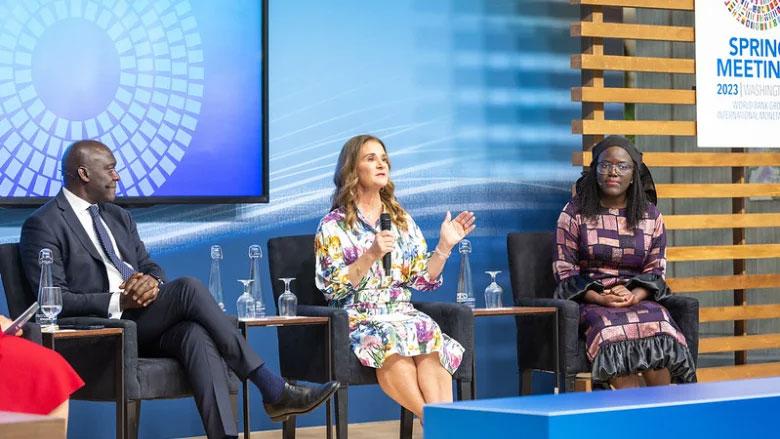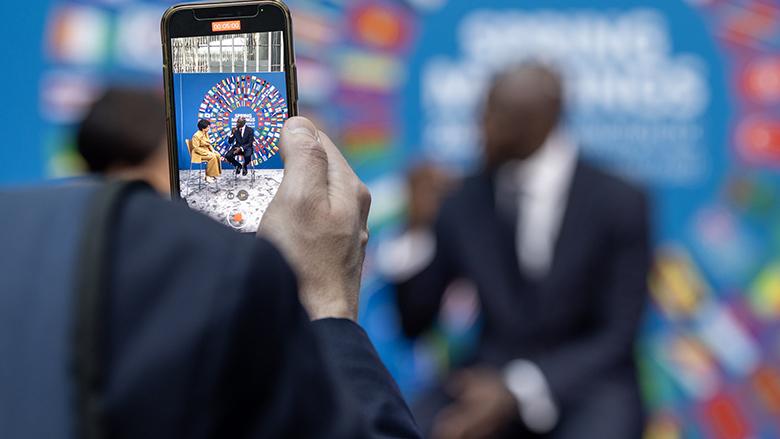[Gregory J. Felder] Hello, and welcome to the 2024 Annual Meetings of the IMF and the World Bank Group. My name is Greg Felder, and over the next 30 minutes or so, we’ll hear from distinguished world leaders about the global challenge of creating jobs for young people and the need for bold and innovative solutions. Due to dramatic increases in population, sub-Saharan Africa will be home to more than one-third of the planet’s youth by 2050. Now, improved education means stronger aspirations, but under the current trajectory, job growth cannot keep up. So, the World Bank Group has created a high-level Advisory Council to identify actionable policies and programs to address the looming job crisis. The goal is to transform this challenge into an opportunity and drive future prosperity. So, to discuss this, I have the pleasure of inviting three global leaders to the stage. Please, help me welcome Ajay Banga, President of the World Bank Group, Tharman Shanmugaratnam, President of the Republic of Singapore, and Michelle Bachelet, the former President of Chile. [Applause] [Gregory J. Felder] Welcome. All right. Welcome, everyone. If you don’t mind, I’ll get right to it. [Ajay Banga] Yeah. [Gregory J. Felder] Ajay. Back in August of this year, the World Bank Group announced the creation of this Council. Can you tell me a bit about the motivation for creating this Council and why now? [Ajay Banga] Yeah, sure. And Greg, thank you for doing this again. And you drew the short straw to be with us. Congratulations. [Gregory J. Felder] No, it’s an honor.
[Ajay Banga] I got to start by thanking both, President Tharman Shanmugaratnam, and President Michelle Bachelet. It’s not that these people have a lot of time on their hands, and they still decided to devote what time they don’t have to enabling the Bank to be a better player in what I think is a global challenge. The issue at hand is that 1.2 billion young people in the emerging markets are coming through the pipe to become eligible for a job in the coming 15 years. Most people in the emerging markets, and most of us, address that as a demographic dividend for these countries. And yes, it is a dividend if, like you and me, they grow up with clean air, clean water, health care and education, and when they are grown up, they get access to a job because a job is not just income, it’s dignity. A job is not just dignity, it fights poverty. The best way to fight poverty, the best way to put a nail in the coffin of poverty is a job. I think the reality of a job is that it enables you to lift your life and your family. That’s why they say poverty is a state of mind as much as it is a state of being. That’s why we’re here together to find a way for those 1.2 billion young people of which the current emerging markets look like they’ll only generate 400 million odd jobs in the same countries, which means we’ve got a big gap. Forecasts are not destiny, but it will be destiny if we don’t do something about it. That’s the purpose. How do we create the right enabling environment? How do we create the right capital? How do we create the right human capital, the right infrastructure, and the right system for the private sector, particularly small businesses, which in turn are large generators of jobs? That’s the purpose of the Council. The World Bank has many assets to bring. We understand the public sector, we understand the private sector, we understand how to enable policies; but having an outside-in view from practitioners and from people who have done this with great success in their life, the two of them, but the Council they’ve put together is to me, my biggest asset. That’s why we’ve got this going, and that’s why I want to thank them again for being here.
[Gregory J. Felder] Thank you, Ajay. I want to thank you, too, as well. We’re so happy to have you supporting this initiative. I want to know a bit about your personal motivations as well. Why is now such an important time for you to be serving as co-chairs of this council? President Tharman, I’ll start with you.
[Tharman Shanmugaratnam] Well, taking off from what Ajay said, the three defining challenges of our times, of the next decade, and the next 30 years. First, tackling climate change. Second, keeping an open rules-based international order, keeping the peace, keeping trade and investment flowing and data flowing. But third, changing that trajectory of job creation, lifting the trajectory of job creation. If we don’t do that, it’s going to be very hard to sustain domestic support anywhere for climate change. It’s going to be very hard to sustain support anywhere for an open world order. We know those problems. So, tackling those three challenges depend on each other, but they can’t wait for each other by the same virtue. We have to give urgency to job creation, and the developing world is where the challenge is the largest because that’s where you have the youth bulge that Ajay spoke about, and that’s where you have the largest under-employment of women, huge under-employment of women, very low labor force participation rates in parts of the developing world, but also most women simply being in the informal labor force, where their trajectory through their careers is flat. They stay as helpers or operators reporting to male supervisors. Huge wastage of talent. So, jobs have to be a defining challenge that we give whole of government attention to and we give international attention to. I think some of the issues that we have to address, and I’ll come to it later, are not new issues. They’re about what has worked well in the past in some parts of the world, but are not being replicated in other parts of the world, in education, in skills’ development, in the way in which we run an economy where the private sector is enabled in job creation. But there are also new challenges coming out of AI, more broadly, the digital challenge, which can become extremely divisive internationally. The challenge of decarbonization itself, how that itself should be treated as an opportunity to create new jobs, and the challenge of adjusting to new global value chains, the way in which globalization is being reorganized. It’s not disappearing, by the way. Globalization is still alive and well, but it’s being reorganized. In that new global context, what does Africa, what does South Asia, what does Latin America, what do countries do to insert themselves, plug themselves in, and get onto a learning curve? I’ll just make one final point. In all my experience, the experience of many countries as well, success in job creation, success in an economy, is not about reaching an end state. Success is a process. Success is about getting onto a learning curve, moving up the value chain over time, skills begetting skills, enabling workers and firms and whole clusters of firms within an industry to learn by doing. Success is about rising aspirations, and success is about changing the political economy of a country, so that policymakers are rewarded for reform and rewarded for staying inserted in a global world economy rather than closing in on themselves.
[Gregory J. Felder] Thank you, President Tharman. President Bachelet, let me turn to you quickly. I know that during your tenure, you worked on implementing a series of policies that were aimed at bettering infrastructure, supporting job growth. Tell me a little bit about what you learned during your presidency that you’re now bringing to the council and why now is such an important time.
[Michelle Bachelet] Well, first of all, very little about my motivation to be here is because I’ve always been, I would say, championing development, and also fighting poverty, and trying to alleviate also hunger and poverty. I think that Ajay and Tharman already mentioned a lot of factors. I’m not going to repeat that. But I do believe that job creation is essential on human dignity and respect and self-esteem, but also in terms of the possibility of getting out of those situations. There’s a lot of challenges, and we’re going to talk afterwards about that, and we have been speaking with the Council about that. But I think it’s mainly because I also believe that the biggest problem with underemployment, unemployment, informality is from women. It has a gender perspective that is essential. That has motivated me. In terms of, you asked me now what I have learned in my experience in government? [Gregory J. Felder] Correct. [Michelle Bachelet] That could help in this, why I’m here, why I accepted this job? [Gregory J. Felder] Yes. [Michelle Bachelet] It’s not a job, but it is a responsibility. I accepted it because I feel that in my experience as Minister on one hand, as President twice, as High Commission of Human Rights, and as UN Women Executive Director, I’ve had to deal with many of these issues. During the crisis, the economic crisis, we had a lot of people who got unemployed, and we had to think on new ways of how to produce jobs, create jobs with the private sector, of course. Of course, some in the public sector, but the majority on the private sector. But also, we had to think on people, how we could improve the possibility of people who were not very skilled, but they could improve their capacities and skills. And we did a lot of programs on that as well in my country. And also, we thought on how we could support education quality on vulnerable children who could have low quality education, but how we took them, support them so they could get into higher education and they could really have better opportunities. I would say there’s a lot more things that I could say. Even though I’m a Latin American, I will respect the time. I won’t speak so long. Thank you.
[Gregory J. Felder] Thank you. Thank you both. I understand the three of you just came from the first Council meeting. Could you tell me, and I’ll start with President Tharman, a bit about the Council’s membership, some key takeaways, and what you discussed today?
[Tharman Shanmugaratnam] There are 18 members of the Council. They’re spread across all regions, genders are about equal. But most importantly, we bring valuable experiences. Policymakers, people with experiences in a range of different sectors of business, NGO activists and academics. We’ve had a very rich discussion focused on what we think the key barriers that have to be addressed today are, and what are some of the needle moving initiatives required. What should we focus resources on? There’s no silver bullet to job creation, but there are solutions, and there are clusters of solutions that have to be adapted, and we have to learn as we go along. Don’t go for perfection. Don’t let perfection get in the way of continuous learning and adaptation because that’s what success and job creation is about.
[Gregory J. Felder] Thank you, President Tharman. President Bachelet, any other key takeaways from today’s meeting?
[Michelle Bachelet] Well, first of all, I want to congratulate and thank the President, Ajay, because I think this was a great…
[Ajay Banga] By the way, of all the three on this stage, I’m the only one who shouldn’t be called President. You both should be. I should be called Ajay.
[Michelle Bachelet] Yeah. No, but I think it’s so important. The group that has been organized is really a very interesting one because many of them even say things that make me think about the way I have been thinking about jobs. I mean, because sometimes my normal way will be to say, “we have to finish all informality and we need to formalize.” And I still... But I heard things that were really interesting. I would say, I think this is a very challenging task, but I think the group is fantastic. Some few takeaways, I would say that we were able to identify which sectors create more jobs. And that means that we have to think. We also were able to understand and identify that obstacles were not the same in every country. So, maybe we need to think on some special countries to think what they can get from them because situations are very different from some regions to other regions or inside each region. We need I would say to try to, as Tharman said in the meeting, to find new ways, but also to continue working on ways that are being done, but that should be expanded, multiplied. So, I will finish there because I think there were many, many things, but we’re just starting. We need a lot of work to do in the future.
[Gregory J. Felder] Thank you. I look forward to hearing more announcements coming from the Council in the future. Ajay, my last question is for you. So, we’re talking about the creation of jobs, but can you tell me a bit more about the quality of jobs. Do you think there’s such thing as a “good job?”
[Ajay Banga] I mean, all jobs are good because jobs give you dignity and earning. Some jobs are better than just good. Everybody wants to climb up the ladder of a good job. I think President Tharman today in the session made a really good point about the ladder, which has been in my mind for a long while. To climb a ladder, you have to get your hands on the bottom of the ladder so you can climb the rungs. I think what we have to do is to be careful to not prejudge everything from one eyesight, but to remember, the alternative of not having a job is a really poor alternative for young people and women. It’s not just a working job, it’s entrepreneurial opportunities. Michelle is a great supporter of gender. We were talking along with a few other members, we’re going to be launching a great gender event tomorrow. One of the things we’re talking about, and Mamta [Murthi] is leading this for us, is the question of getting financing to women for entrepreneurship. Women entrepreneurs employ women as well. They liberate the idea of getting more women a chance to be productively employed in our society and our system. There’re many things about jobs that I don’t want to qualify into good and bad, formal and informal, good and better. I want to first start with jobs. I want to start with the dignity of a job, and then I want to work our way up that ladder to always improve a person’s chance. The process that President Tharman talked about, the process is as important as the end. That’s where we’d like to go.
[Gregory J. Felder] Thank you. President Tharman, looks like you have something to add.
[Tharman Shanmugaratnam] Three low-hanging fruits. First, tackle childhood stunting. The World Bank has been pointing this out. Several countries are now taking it seriously. In my part of the world, Indonesia, for instance, is now rolling out a nationwide nutrition plan. Childhood stunting is a huge problem. 30% of kids up to age five in low-income countries suffer from stunting, which is a lifetime that is stunted. 25% or a quarter of those who are in low and middle-income countries are stunted. It’s about individuals having their lives reduced, but it’s about whole nations having their potential reduced. It can be tackled. We know what has to be done in nutrition and early childhood upbringing and maternal health. Second, low-hanging fruit. Quality of education, not just quantity, not just looking, tracking numbers of how many years of schooling people put in, boys and girls. Again, the World Bank has been pointing this out. Learning poverty is still a huge issue. On average, in the developing world, kids of a certain age are actually, in learning age terms, three years below their actual chronological age. Kids in grade five, 50% of them do not have the basic reading skills, the basic arithmetic skills that grade two should have. So, tackle quality, teacher training, how we organize recruitment of teachers, how you incentivize them. Tackle quality, not just quantity. Third issue, the massive mismatch of skills demand and supply when people leave school or even when they leave college. It’s not just a developing country problem. It’s a problem in the United States, in the UK, in Europe, everywhere. But it’s a huge problem in the developing world. That mismatch of what people are trained for compared to what is in demand in the market, which leads to a defeat of aspirations, particularly for those who’ve spent resources on going to college or going to university, and then find out when they come that they don’t have anyone who’s interested in what they were trained in. Again, it can be fixed. We need to, in fact, close the gap between employers and educational institutions, and use technology where possible to close those information gaps, get a lot more granular information on what employers need, feed it back into curricula, increase internships, increase what’s called the dual education mode, where people study and work at the same time. Some countries are trying it out quite successfully, and it needs to be replicated. Essentially, we need fairly wholesale reform in tertiary education systems and skills development systems at that stage when youth are about to enter the workforce, but also once they’re already in the workforce.
[Gregory J. Felder] Thank you, President Tharman. Thank you, President Bachelet, and thank you, Ajay, for your time today. That will bring us to the end of this event. I hope it’s been informing and engaging for all of you. You can watch the replay of this event or any other event. Just visit live.worldbank.org. Please, continue sharing your comments. We’d love to hear from you. Just remember to use the hashtag #WBGMeetings. Thank you for joining us and take care.


